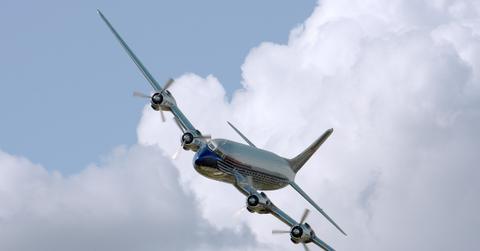Planes Turn To Vegetable Oil In Search For Green Fuel In Europe
Airplanes are getting the renewable fuel treatment in Europe. A Finnish company, Neste, has developed a diesel mixture with excess animal fat and vegetable oil that could decrease carbon dioxide emissions by 90 percent in its purest form.
Updated May 23 2019, 3:46 a.m. ET
The pursuit of renewable fuel is a major priority across the globe. When it comes to travel, airplanes are one of the worst offenders when we consider pollution. Thankfully, researchers are on the hunt for environmentally friendly ways to fuel planes without harming our planet. And from the looks of it, they're getting creative. For example, airplanes in Europe will soon receive a renewable fuel created from vegetable oil and animal fat from Neste, a Finnish company. That's right: Vegetable oil may be a key ingredient in our path to keeping the air clean and safe.
Neste’s renewable fuel will make its way to the Geneva Airport at the end of next year. They’ll be using just one percent of renewable fuel initially, but the obvious goal is to increase that amount in the future. Passengers won't be able to tell the difference with how much of the gas mixture is renewable. The company is reaching out to other European airports to increase the fuel’s reach.
“We have the advanced technology to make renewable fuel and we are the only company that can make it at the real industrial scale required,” Matt Lievonen, the CEO of Neste, told The Independent. The goal for Neste is to become the leading producer of the renewable fuel, and it certainly has a lot of potential based on previous results.
Lufthansa, the largest airline service in Germany, tested the fuel on over 1,000 flights in 2011. They used a 50 percent mixture of renewable and kerosene blends. Carbon emissions nearly dropped by half at 47 percent. In its most purest form, the company believes emissions can drop by up to 90 percent when compared to traditional fossil fuels.
Neste has already teamed up with select cities to fuel their buses with 100 percent renewable diesel. This includes a couple cities in the United States, such as San Francisco. It stays in line with the city, and the state of California in general, with their push toward less carbon emissions with renewable energy sources and electric vehicles.
This new diesel gas is created from animal fat waste and vegetable oil. Fat waste wasn’t an applicable ingredient until just a few years ago when Neste developed a solution. They are bringing in excess fat from slaughterhouses and extra cooking oil from restaurants. Both of these products are refined into the usable liquid in their renewable gas.
While this fuel could make a big dent in carbon emissions, it’s not the go-to answer for every mode of transportation. Putting it in traditional vehicles wouldn’t make a significant impact, and Lievonen believes electric vehicles will be the standard in urban areas in the future. This is why there’s the focus on air travel and large public transportation.
Some controversy exists with the creation of Neste’s renewable fuel. Activists claim that buying oil leftovers from restaurants is tied with supporting the palm oil industry. They have a bad reputation due to their connection with deforestation, but there’s also debate on how much impact it really has. Lievonen explains that his company is using waste that would be tossed anyway.
